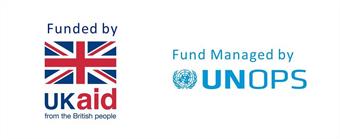
Immunization is a proven tool for controlling and eliminating preventable life-threatening infectious diseases and is estimated to avert 2 to 3 million deaths globally every year. It is also one of the most cost-effective health investments, with proven strategies that makes it accessible to even the most hard-to-reach and vulnerable populations in the world.
In Cox’s Bazar, WHO is contributing to bridging the immunization gap by promoting community theater in the Rohingya refugee camps. The initiative brings together Rohingya and Bangladeshi youths in a collective action to disseminate key messages and ensure that every child and pregnant woman living in the refugee camps and nearby host communities are protected from vaccine-preventable diseases.
“We want to increase the uptake of immunization among the Rohingya refugees”, says Adama Thorlie, WHO Risk Communications Consultant to explain why the community theater taking place in the Rohingya refugee camps is an effective way to bring more people to the vaccination sites. “We thought that by having a performance of theater, where we bring together the Rohingya population with the host community, and then create a story with a message about health is what makes this initiative different”.
Vaccines don’t only protect individuals, they offer security to everyone in the community. With more people vaccinated, the more protected the community will be from preventable, and sometimes fatal, diseases. Vaccines are especially important in the Rohingya refugee camps due to their poor living conditions and the existing misconceptions about vaccination, thus the importance of this innovative approach.
.jpg?sfvrsn=29b29098_0&MaxWidth=630&MaxHeight=&ScaleUp=false&Quality=High&Method=ResizeFitToAreaArguments&Signature=266FB0D24A0DE16AF002CE94414377D3B3CED179)
WHO Bangladesh/ Tatiana Almeida
“Our parents and grandparents didn’t receive vaccines, so we don’t know much about it”, explains 20-year-old Rahema* from the Rohingya community. “By taking part in this community theater, I learned about the importance of vaccination and shared this information with my family and community. I want to help Rohingya people understand the benefits of immunization”.
Rahema* is one of the many agents of change contributing to increasing immunization among Rohingya refugees by raising awareness on good health seeking behavior. The project started five months ago with a survey to understand the barriers to immunization and resulted in a community theater play where Rohingya and Bangladeshi explain the risks of not vaccinating children and the benefits for everyone’s health when immunization reaches an entire community. During the play, the actors also explain where vaccines are available and the importance of keeping vaccination cards and getting all recommended vaccines, especially for pregnant women and children under 2.
“In the Rohingya community, most of the people believe that vaccination makes them sick because sometimes it causes fever, swelling and body pain. Rohingya people have inspired us to do this play, we used our creativity to bring them these important messages”, says Munir, a Bangladeshi aged 20.
.jpg?sfvrsn=8f17a407_0&MaxWidth=630&MaxHeight=&ScaleUp=false&Quality=High&Method=ResizeFitToAreaArguments&Signature=E6D0CFC3E6F3C8322EFCF29A50AEB723F743D911)
Munir, aged 20, performing at Rohingya refugee Camp 10, Ukyia, for children and women
WHO Bangladesh/ Tatiana Almeida
The initiative is taking place in different camps that are performing poorly in terms of immunization coverage to reach different areas where Rohingya refugees live and has had the support from the CiC (Camp-in-Charge) and the Rohingya community leaders who are contributing to bringing these messages to more people.
“Community theater is a piloted activity that aims at increasing immunization coverage in low-performing areas”, says Dr. Khalid El Tahir, WHO Emergency Sub-Office Incident Manager. “Through this, WHO is contributing to an enabling environment that creates a sense of ownership among the young performers as they are taking the responsibility for their own health and that of their families and communities.
.jpg?sfvrsn=d04f7345_0&MaxWidth=630&MaxHeight=&ScaleUp=false&Quality=High&Method=ResizeFitToAreaArguments&Signature=A858452536AF931A1B8EF8F548447F7CE7A01682)
WHO Bangladesh/ Tatiana Almeida
When children miss out on life-saving vaccinations, their families have greater chances to witness illness, disability and even death from vaccine preventable diseases. To fulfill WHO’s vision of a world free of vaccine-preventable diseases, each key player must fulfill their mandate including parents, health workers, programme managers, governments and partners.
This project was funded by with UK aid from the UK government. WHO currently is exploring opportunities to expand the initiative.
*Not their real names
‘This material has been funded by UK aid from the UK government, however the views expressed do not necessarily reflect the UK government’s official policies.’
